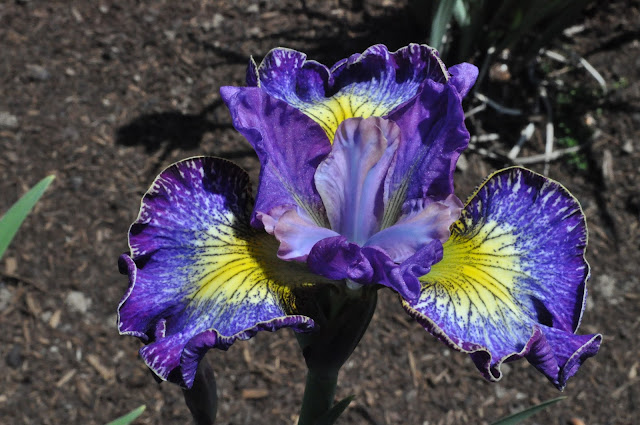Mt. Pleasant Iris Farm: Part 1
By Bryce Williamson
By Bryce Williamson
The
last two years on trips to view irises in Oregon and Washington, I have had the
opportunity to visit the wonderful garden of Chad Harris and Dale Grams in
Washougal, Washington. Located in the
National Scenic Columbia River Gorge, the present garden was started 22 years
ago when Dale and Chad retired and moved into the area.
Driving
up Highway 14 , the road dwindles from 4 lanes to two, and just past Washougal,
the Mt. Pleasant Iris Garden suddenly appears on the north side of the road
with rows of irises descending down the south slope from the house towards the road and the
Columbia River. What now appears to be
so organic and natural was actually carefully planned by Chad and Dale: strategic
plantings of native Douglas Fir trees have been used to break the easterly winter winds
and now shelter the house, the iris plantings, and the sweeping expanse of
specimen trees and shrubs. Since there is
such a variety of irises—everything from Medians through Japanese, I am
dividing these posts on Mt. Pleasant Iris Farm into several parts to better showcase
the different types of irises.
For
the last two years, Chad has not had much room for seedlings since the
garden contained one of the master plantings for the 2015 American Iris Society National
Conventions held in May. Chad’s iris
hybridizing has three foci—working with his award winning line of I. ensata
(Japanese irises), I. laevigata, and most recently I. pseudata.
For the sake of making things simple, I have combined images from both the 2014 and 2015 visits to Mt. Pleasant and, in this post, will focus on Siberians.
For the sake of making things simple, I have combined images from both the 2014 and 2015 visits to Mt. Pleasant and, in this post, will focus on Siberians.
Since I have not visited many iris gardens in the last 10 years, the breakthroughs in
Siberian iris colors has been a revelation. Gone are the days (50 years ago!) when the colors were white, lavender, blue, or violet. Today’s hybrids
have a wide range of interesting and delightful color variations. The hybrids of Hollingsworth and
Schafer–Sacks are leading the exploration of new colors and patterns, and others are adding quality varieties as well in the expansion of colors and forms. Pictured below is a close up of Bob Bauer and John Coble's Concord Crush, a variety with six to nine falls.
'Butterscotch Fizz' by Marty Schafer and Jan Sacks 2013
'How Audacious' by Robert Hollingworth 2009
 |
| "How Audacious" 'Paprikash' 'Tranquility Base' |
'Swans in Flight' by Robert Hollingworth
 |
| 'Neptune's Gold' |
 |
| 'Honey Chic' (Image by Kelly Norris) |
'Carnivalito' Image by Kelly Norris
As a retired English teacher, I drenched the page in red ink when a student veered from the main topic. I am guilty here of doing that very thing, and the following images show the new colors of the Siberians from places other than Mt. Pleasant. I will return to the lovely Mt. Pleasant Iris Farm with more pictures in the next post. For now, take a look at these lovely color breaks in Siberians by Brock Heilman that illustrate the new color directions in Siberians. Brock, a talented photographer, also sells photos, and his work can be found at Brock Heilman Photography.
'Cape Cod Boys'
'Black Joker'
'Cherry Fling'
'Cinnamon Sugar'
'Cream of Tomato'
'Fancy Me This'
'Head Start'
'Lucky Locket'
'My Little Sunshine'
'Sweeter Still'
Chad Harris's introductions can be found at two sources: Mt. Pleasant's Iris Farm and Aitken's Salmon Creek . Both carry a wide variety of irises including Siberians.
Images copyrighted.



















